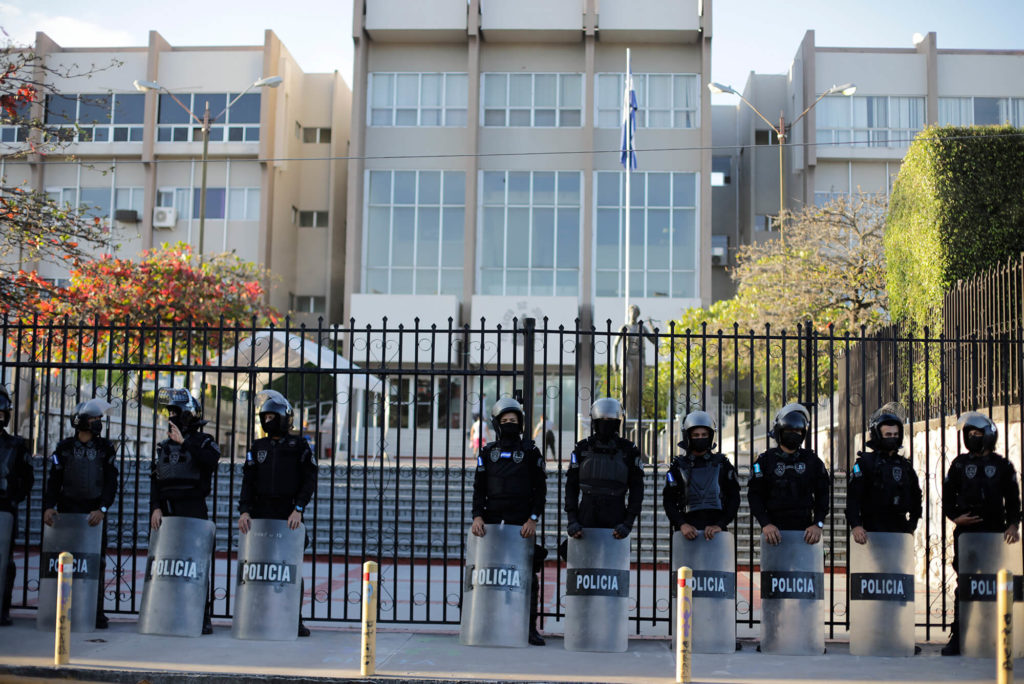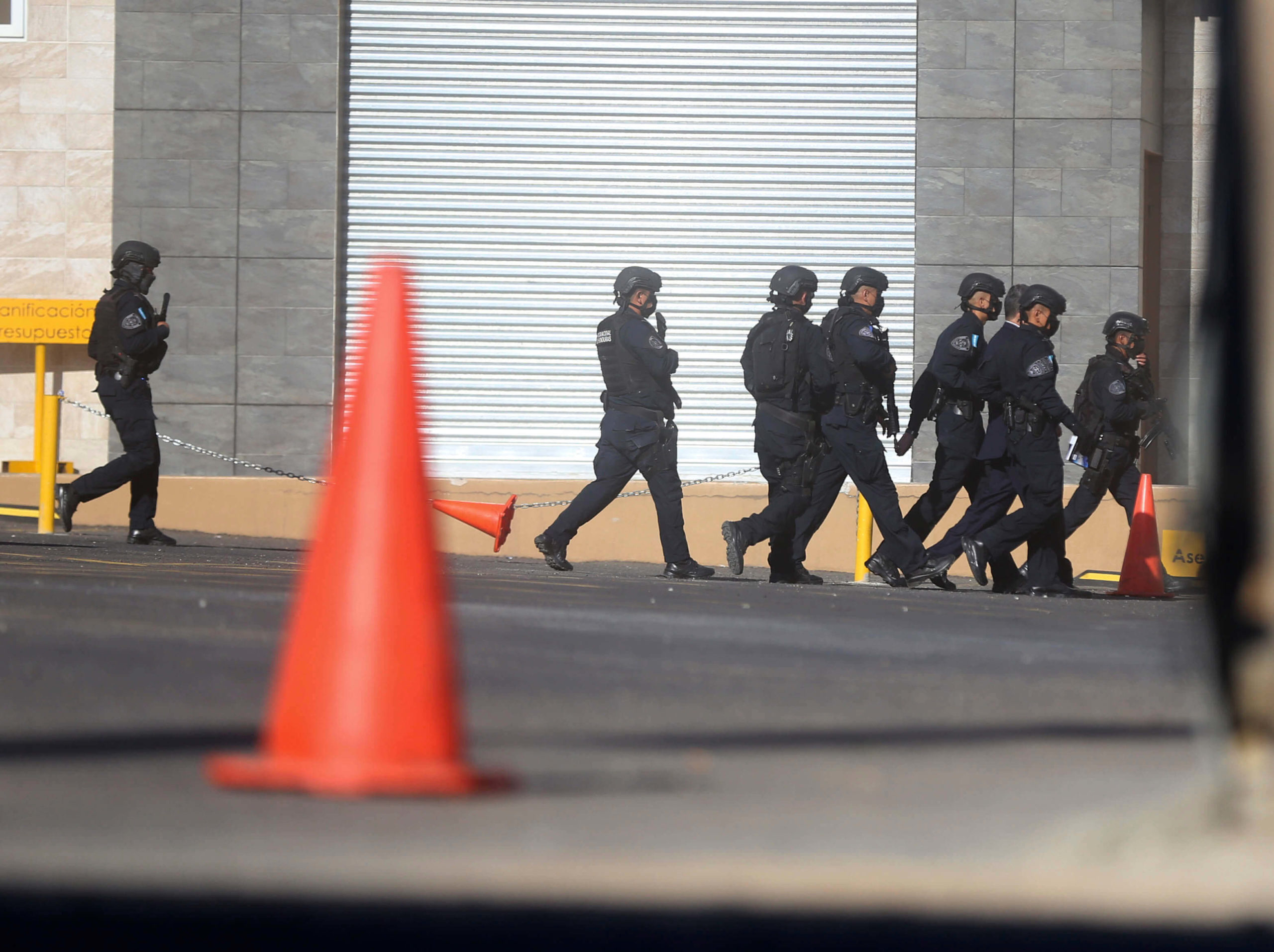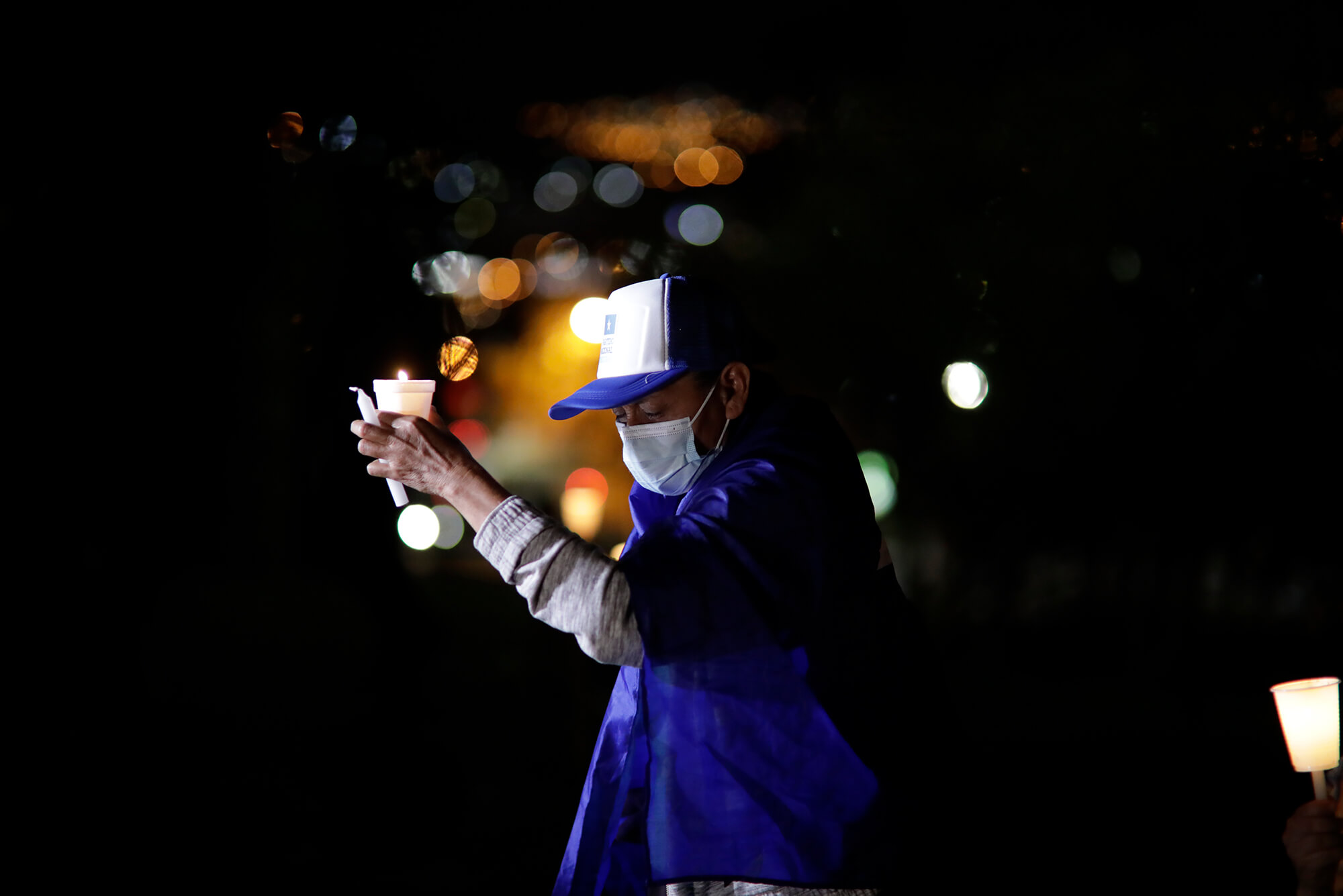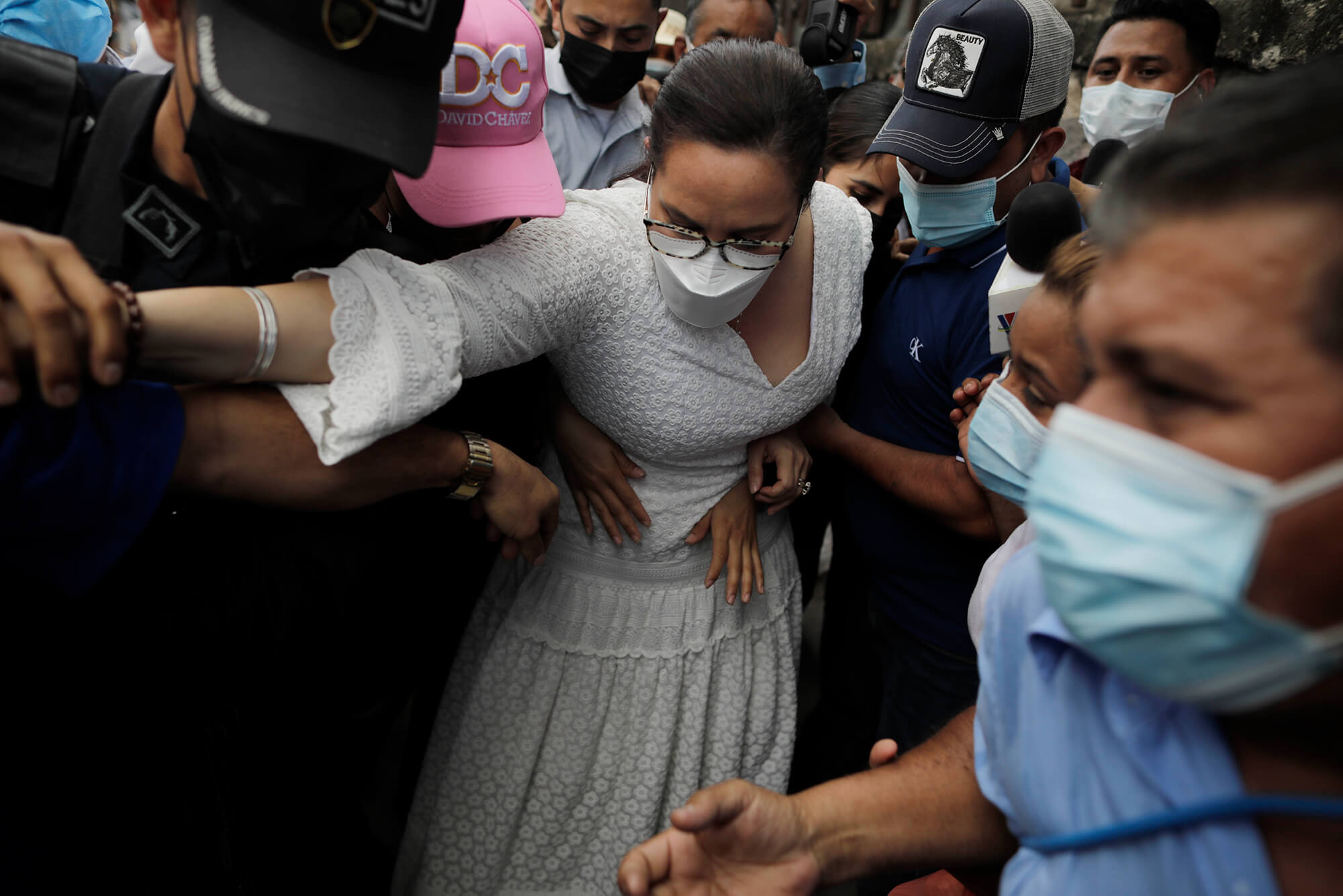On March 16, after a judge authorized the extradition of former President Juan Orlando Hernández to the United States on drug trafficking and weapons charges, Hernández sat down in the Supreme Court president’s chair and began to record a video. The incident did not sit well with the Special Commission on Extradition of the National Congress, which had met in the same room a day earlier with several Supreme Court judges, including the president of that body, Rolando Argueta Pérez.
By Leonardo Aguilar
Photos by Jorge Cabrera
Former President Juan Orlando Hernández, wanted in the United States for drug trafficking and weapons charges, had just learned that a Honduran judge had authorized his extradition. The U.S. believes he is a major drug trafficker like his brother Antonio “Tony” Hernández, who is serving a life sentence in a New York state prison. But instead of looking worried, the clean-shaven former president, dressed in a suit and tie, calmly sat in the Supreme Court president’s chair and recorded a video of himself.
It had been a hectic day for Hernández. His guards had hustled him into a helicopter at the last minute to transport him to his 9:00 a.m. court hearing, later claiming that his supporters had planned to block vehicles taking him to the hearing. Commissioner Miguel Pérez Suazo, who commands the Special Forces “Tiger” Unit, said that 280 agents were deployed to guard the Supreme Court facilities, with another 50 agents stationed in the hearing room.
When he arrived at the Supreme Court, Hernández raised his arms and thanked those who had prayed for him. He then complained to his supporters about the way the police conducted his arrest, how his grandmother had died while he was in prison, about his limited access to a telephone, and that his constitutional rights had been violated.
“We’re minutes away from the end of this hearing, and the judge is going to say something that apparently the news media already knows. I don’t know what that is, but I have prayed to God that the decision be what he would have it be,” said Hernández in the unexpected video, recorded a month after he was arrested at home and taken in shackles to jail.
Hernández, who asked that his case be studied by students and academics so that “the world understands what happened,” went on to say that he was arrested out of “revenge,” and that he made Honduras “safer” while president. He thanked the “thousands” [of people] who had gathered to pray for him outside the Special Forces jail where he is being held. Later in the video, Hernández referred to himself in the third person. “My lawyers have presented a staunch defense to the judge. I say this as a lawyer, not as Juan Orlando Hernández, the person they are defending.”
The chair in which Hernández was sitting belongs to the president of the Supreme Court, Rolando Argueta Pérez. Before assuming his current position, Argueta was the director of prosecutors in the justice ministry. Argueta has been criticized for his lukewarm effort against corruption and drug trafficking in Honduras, and some legislators have threatened to impeach him. Argueta and Hernández are open about their friendship ─ both come from Gracias, Lempira and are members of the National Party.
Contracorriente interviewed attorney and legislator Silvia Ayala, one of the seven members of the Special Commission on Extradition appointed by the National Congress to prepare a report on the extradition-related roles of the Supreme Court, the Attorney General’s Office, the Ministry of Security, and the Ministry of Foreign Affairs. The report will be presented to a plenary session of the National Congress.
Ayala said that the day before the judge authorized Hernández’s extradition, they [the Special Commission] had sat in the same room where Hernandez recorded the video, listening to the judges present their report on the extradition proceedings.
“Yes, that’s the chair that belongs to the Supreme Court president [Rolando Argueta]. I say this because we were in that same room with him the day before.” Silvia Ayala.
Ayala said that the National Congress appointed the Special Commission because it was widely recognized that people requested for extradition have not all been treated equally. She confirmed that the Hernández video incident will be included in the [Special Commission’s] report. “We have seen how some people have their hearings take place in a matter of hours or days. The [extradition] request is approved and they are handed over to the authorities of the requesting country,” she said.
Ayala says there has been favoritism in Hernández’s case. “We have also seen, and this has been confirmed by the Supreme Court, that some people are held in penitentiaries ─ maximum security prisons. But in other cases, people are held at a military facility, while Hernández was given preferential treatment and held in a police offer’s room,” says Ayala.
“We were surprised that Hernández was allowed to record and upload a video in the same room where the president of the Supreme Court met with us a day earlier since that room is for the exclusive use of judges,” she says.
We asked Ayala if the Special Commission intends to include the video recording incident in its report to attribute some responsibility for the incident to the Supreme Court. Ayala said, “The seven members of the Special Commission will conduct a joint analysis and our report will be prepared in a collegial manner. Once we have collected all the necessary information, our report will answer this question.”
The legislator maintains that Hernández should never have been allowed to have a cell phone or any other device while in detention, much less be allowed to upload messages to the Internet during his second extradition hearing. “The Supreme Court clearly enabled Juan Orlando Hernandez to transmit his message,” said Ayala.
On March 17, the attorney general urged the Ministry of Justice to immediately solicit the seizure and confiscation of all assets held by Hernández. However, the Office of the Attorney General reversed itself a day later in a statement that asked for “respect for due process and legality, given the appeal filed by Juan Orlando Hernández.”
Have the former president’s constitutional rights been violated?
In an interview with Contracorriente, Dr. Joaquín Mejía Rivera, an expert in human rights and international law, says he doesn’t believe that Hernández’s constitutional rights have been violated.
Dr. Joaquín Mejía says that extradition hearings are not a trial to determine the guilt or innocence of Juan Orlando Hernández, but simply an administrative procedure to determine whether the extradition request by the United States meets all the requirements.
“What are the requirements?” asks Mejía, adding, “First, there must be a legal relationship between the United States and Honduras established by an extradition treaty. And there must be a formal [extradition] request and charges by the requesting state─ the United States in this case─ against a person in Honduran territory.” Mejía says that due process was followed in Hernández’s case and he was even allowed to appeal the judge’s decision to authorize his extradition.
Hernández’s 12-person defense team has filed an appeal, which will now be adjudicated in a Supreme Court plenary session that recuses the judge who handed down the decision under appeal.
Raúl Pineda Alvarado, a constitutional lawyer and long-time Hernández ally in the National Congress, told Contracorriente that Honduras is not the paradise of peace and security that Hernández extolled in his video. “The trial will provide the opportunity to demonstrate whether or not this is a case of drug traffickers exacting their revenge [on Hernández]. This extradition process is an administrative procedure of the court that merely determines whether the [extradition] request meets the formal requirements,” he said.
The Special Commission on Extradition’s report could lead to the impeachment of the attorney general and the 15 Supreme Court justices
Contracorriente interviewed attorney Ramón Enrique Barrios, who heads the Special Commission on Extradition that was instructed to meet with the Supreme Court, the Office of the Attorney General, the Ministry of Security, the Ministry of Foreign Affairs, and the United States Embassy.
Interviewed separately, Barrios and Ayala gave us a glimpse into the information obtained in the two meetings held so far with the attorney general and the Supreme Court. The information from these two entities pertains to actions taken by judges and prosecutors in response to extradition requests. Ayala said the Supreme Court confirmed that 97 people have been requested for extradition, of which there are still 32 arrest warrants pending execution. She says that the judges interviewed allege that several people requested for extradition were not arrested because the Ministry of Security did not carry out the order during the Hernández administration.
Ayala said that during the meeting with Attorney General Óscar Fernando Chinchilla, he claimed that the attorney general does not have a principal role in the extradition process because “a foreign government is the entity making the request for extradition of a Honduran citizen.” However, according to Ayala, the Attorney General’s Office has participated in two attempts to apprehend and arrest people requested for extradition.
“In our meeting with the Attorney General’s Office, they told us that some people indicted in the U.S. were tried and acquitted in Honduras,” said Ayala. “But when they were later extradited to the U.S., they pleaded guilty to the same charges of which they were acquitted by our justice system.”
“This is something else that needs to be determined─ why were these people acquitted in Honduras when the U.S. justice system found enough evidence to convict them?” Congressperson Silvia Ayala.
Honduras amended its constitution in 2012 to allow the extradition of Hondurans charged in a foreign country with drug trafficking, terrorism, and organized crime. However, crimes committed in Honduran territory by extraditable people generally go unpunished if the Attorney General’s Office declines to take the cases. The U.S. requests the extradition of Honduran citizens when it believes that they have committed or conspired to commit crimes on U.S. soil.
Ayala alleges that the Attorney General’s Office tried to justify their ineffectiveness by claiming they did not want to interfere in the extradition process, since a citizen cannot be extradited while legal proceedings are pending in Honduras. “There were some extradition requests that they [the Attorney General’s Office] said they didn’t pursue so as not to impede the extradition request process,” said Ayala, adding that meetings have been scheduled for the week of March 21 with the U.S. Embassy, the Ministry of Security, and the Ministry of Foreign Affairs.
Are there any formal motions or bills to impeach the Attorney General or Supreme Court justices?
Silvia Ayala says that no official motions or bills have been presented so far in the National Congress to impeach the attorney general or the Supreme Court justices. “There is still no talk of impeachment because the commission cannot reveal its findings yet nor presume the outcomes of its report. That will be decided in a plenary session of the National Congress. The commission will make recommendations, but any decisions will be made in this plenary session,” said Ayala.
The Special Commission chairperson, Ramón Enrique Barrios, told Contracorriente that they are analyzing previous extradition processes to establish a standard timeframe for the process, the actors involved, and the agencies and government institutions responsible for processing extradition requests. So far, 90% of the cases started with the Ministry of Foreign Affairs receiving an extradition request from a foreign government and ended with the Supreme Court ordering the handover of the extradited person to the requesting government.
Barrios also said that they are analyzing why some extraditable people have their assets seized and others do not. “That is why we met with the Supreme Court and the Attorney General’s Office, and why we’re also meeting with U.S. Department of Justice officials at the U.S. Embassy, with the Ministry of Security, and the Ministry of Foreign Affairs,” said Barrios.
The commission’s objective is to prepare a report, says Barrios, that will “clarify responsibilities, identify shortcomings, and create opportunities for improvement so that extradition processes are more expeditious and equitable for all. We want to ensure that assets are not unfairly seized and that extradition requests are not unaccountably shelved.”
Is Juan Orlando Hernández a drug lord like Chapo Guzman or Pablo Escobar?
In our interview, Raúl Pineda emphatically disagreed with some sociologists who compare Hernández with Pablo Escobar or Chapo Guzmán.
“No, I think that [to say Hernández is a narco like Pablo Escobar] is a bit of hyperbole, an exaggeration. I think that the former president got into this out of provincial ignorance and ambition.” Raúl Pineda Alvarado
Pineda believes that Hernández was led astray because he was from a rural area, “All the exposure to the evil realities of the big city got him into a mess that will be very hard for him to escape. It turned him into a man who betrayed his country, his party, his family, and his homeland.”
Regarding the former first lady, Ana García, who claims her husband is the victim of revenge, Pineda says, “Ana is now what Xiomara Castro used to be, a defender of her husband [former president] Manuel Zelaya during his political crisis. But in Juan Orlando’s situation, she’s just parroting the lies.”
Joaquín Mejía says that Hernández is not your typical extradition case, “We’re talking about a former two-term president who was illegally reelected, and who also spent four years as president of the National Congress.”
He noted that Hernández needed to put a key piece in place, which he did in the Supreme Court, “Rolando Argueta was not chosen on his merits, but rather because he was a key piece that Hernández had to have. He needed someone who would protect his interests and those of the [criminal] structure that Hernández represents.”
In Mejía’s view, Hernández is merely the face of this criminal structure, and we must heed Kevin Castel’s allegation that Honduras is a narco-state, “To be a narco-state means that legitimate institutions enabled drug trafficking and that Hernández didn’t act alone. There are judges involved and businesspeople who laundered money. Where did the drug money go? It’s in the country’s financial system. We have seen complicity on the part of the Ministry of Justice and the Supreme Court.”
Raul Pineda: Drug trafficking in Honduras won’t stop and violence will escalate
The drug trade produces the worst kind of corruption, Pineda said. This illegal business generates a 2,000% profit from the wholesale purchase of the drug through to its delivery to the large U.S. market.
“Don't think that that drug trafficking will be paralyzed just because Juan Orlando Hernández is prosecuted. It will be taken over by smaller groups, causing even more conflict. But drugs will continue to travel through Honduras.” Raúl Pineda.
Pineda says that the country’s role in drug trafficking has evolved and that Honduras is now a producer of cocaine hydrochloride, as well as synthetic drugs. It even has cocaine laboratories.
“The problem used to be that the [coca] plants grown in Honduras never got higher than 1.5 meters, but in Colón [department] there are now two-meter plants, just like in the best [cocaine-producting] areas of Bolivia, Peru, and Colombia,” he says.
According to Pineda, Colón is a very suitable area for coca plantations, and he thinks that even more coca will be grown in the country. “It’s a serious problem that should be studied by university researchers,” he said.
Regarding the role of the United States, Raúl Pineda says that the Hernández extradition “is a defense mechanism, but they [the United States] aren’t neophytes in all of this either.”









